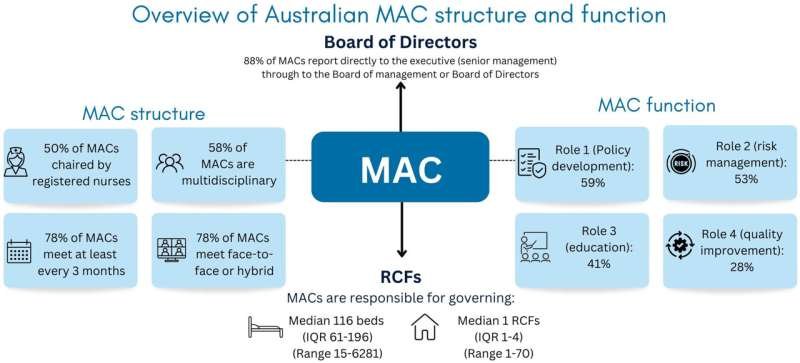
A new national audit led by Monash University has shed light on how medication use is governed in Australian residential aged care, revealing wide variation in the structure and function of Medication Advisory Committees (MACs) across the country.
MACs are central to promoting medication safety in residential aged care, with their presence identified as a key intervention to managing the issue of polypharmacy—the use of nine or more medications simultaneously.
A MAC is a “multidisciplinary committee that provides overarching governance of medication management within residential care homes.” The Australian Government Department of Health, Disability and Aging recommends that all residential care homes have access to a MAC to support safe use of medications and, ultimately, mitigate risks associated with inappropriate prescribing.
Researchers from the Center for Medicine Use and Safety (CMUS), within the Monash Institute of Pharmaceutical Sciences (MIPS), led the national audit to examine how MACs function across their four recommended operational domains; policy development, risk management, education, and quality improvement.
The audit, adapted from the Department of Health and Aged Care’s MAC Audit Tool, involved 120 MACs overseeing 642 residential care homes—almost a quarter of all Australian residential care homes. The results are published in the Australasian Journal on Ageing.
The findings show that MACs are actively involved in policy and risk oversight—with 59% and 53% respectively performing all recommended functions—with further opportunities for capacity building and long-term improvement. Overall, 41% fulfilled all educational roles, and 28% were fully engaged in quality improvement initiatives.
The study’s lead author, CMUS research fellow Dr. Amanda Cross, said, “This audit highlights both the strengths and the areas needing targeted support in how we manage and govern medication safety in aged care. MACs have the potential to lead transformational change in this sector—if adequately supported and resourced.”
With the new strengthened Aged Care Quality Standards due to commence on 1 July 2025, Dr. Cross says “MACs are well positioned to support implementation and monitoring of Quality Standard 5 to ensure delivery of safe and quality clinical care to the almost 200,000 older Australians who access residential care.”
Professor Simon Bell, project lead of the Maximizing Embedded Pharmacists in aGed cAre Medication Advisory Committees (MEGA-MAC) project, said, “The national quality improvement collaborative implemented as part of the MEGA-MAC project utilizes a real-time clinical network designed to deliver, monitor and evaluate quality improvement initiatives.”
More information:
Amanda J. Cross et al, National audit of the structure and function of Australian residential care medication advisory committees, Australasian Journal on Ageing (2025). DOI: 10.1111/ajag.70048
Monash University
Citation:
National audit reveals key strengths and opportunities for medication oversight in Australian aged care (2025, May 26)
retrieved 27 May 2025
from https://medicalxpress.com/news/2025-05-national-reveals-key-strengths-opportunities.html
This document is subject to copyright. Apart from any fair dealing for the purpose of private study or research, no
part may be reproduced without the written permission. The content is provided for information purposes only.

